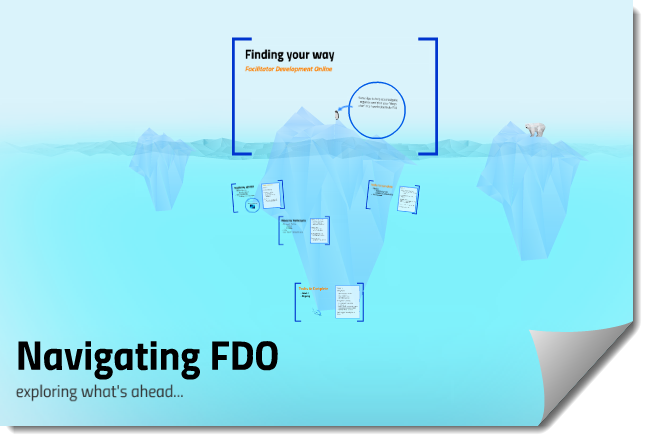Workshop Handbook
| Site: | SCoPE - BCcampus Learning + Teaching |
| Group: | FLO Facilitator Development 2019 OER |
| Book: | Workshop Handbook |
| Printed by: | Guest user |
| Date: | Thursday, 19 February 2026, 7:00 AM |
Description
Facilitators Development Online (FDO) workshop handbook
Introduction
Welcome to FDO (Facilitator Development Online)!
This course is about learning how to (co)facilitate the FLO (Facilitating Learning Online) Fundamentals workshop, which is itself a course about learning how to facilitate online learning more effectively.
Invariably, when describing this to people, it's difficult to avoid making a reference to nested dolls...

Image Courtesy of Paul Martin Eldridge at freedigitalphotos.net
If you are familiar with the ISW (Instructional Skills Workshop), you will recognize the pattern: ISW is a course about learning how to improve classroom teaching skills, and the FDW is about learning how to teach the ISW.
Same idea here: FLO - Fundamentals is an online course about facilitating online learning, and FDO is an online course about how to facilitate FLO.
Note, FDO we also touch on other FLO Family workshops:
- FLO - Synchronous which focuses on facilitating synchronous online learning events, and;
- FLO - Design which digs into the essential elements of designing effective online learning environments.
Anatomy of FDO
Anatomy - Visual Guide
Anatomy - Transcript
FDO course site
This is your learning space.
FLO Sandbox
The Sandbox is your building/testing space. As a companion site to FDO, it is provided to
- give participants easy access to FLO to remember and review the course in detail
- edit access to FLO in Moodle, so they can try out some "facilitator moves"
Tips:
- It can become mind-bending, flipping back and forth between two sites. Use the tab or 'separate window' feature of your browser and check the breadcrumb navigation.
- Items posted in the Sandbox may go unnoticed. If you want feedback or engagement on Sandbox contributions, be sure to bring it back to FDO!
Guiding Documents
- Schedule
- Workshop Handbook
- Unit Notes
Places to Participate
- Discussion Forums
- Ongoing
- Open Forum (questions, answers, news, observations, things you wonder about, what you had for breakfast)
- Weekly nuggets
- Activity Forums
- Specific activities, weekly
- Wikis
- FLO Harvest Wiki
- Moodle Wiki (if used)
- Blackboard Collaborate room (or other web conferencing tools you decide to explore)
Tasks to Complete
(See Schedule for a 'by when' list)
Week 1
- Getting Started
- Read Workshop Handbook
- Read FLO Review
- Begin Learning Journal
- Post Introduction
- Rest of Week 1 Activities
- Intro post for FLO for feedback
- Sue Bizzy Case
- Try and Share - items from FLO Facilitator Checklist
- Readings Review
- Post Journal "nugget"
Week 2
- Try and Share - items from FLO Facilitator Checklist
- Readings Review
- Case Discussions
- Instructor Bulletins Gone Bad?
- Hear Me Roar?
- Facilitation Tips and Strategies Activity
- Post "journal nugget"
Post-FDO Activity
- FDO Feedback
- Building a Community of Practice
Learning Goals
The overarching goal, of course, is to prepare you to co-facilitate FLO.
To get there, we will spend two weeks in a community of supportive peers, exploring the architecture of the FLO from a facilitator's perspective.
You will learn about the "behind the scenes" work and prep required, and you will be given opportunities to actually do some of your own FLO facilitator prep here, by:
- creating artefacts,
- accessing resources, and
- modifying tried-and-true checklists for your own facilitation of the FLO workshop.
Because the main prerequisite of this course is having completed FLO, we will dive right in, assuming you know what we mean when we say things like, "mini-session" or "FLIF" (if you don't remember, you can look to the FLO Sandbox, or post a note to the Open Forum).
All topics and resources in FLO (e.g., about giving feedback, managing workload, supporting diverse learners online, etc) have direct application to your facilitation of FLO. For this reason, we won't be exploring those from scratch. However, we will have a look how they apply specifically to your work facilitating FLO.
This journey is intended to be short, practical, and rich with community participation and sharing from all of you, experienced FLO participants!
FDO Learning Activities
The key learning activities in FDO are:
- Unit Notes: provide context and content for each week, including readings and resources. You will find a variety of resource types (e.g., text, videos, etc).
- Activities & Cases: are designed to get you thinking and preparing for facilitating the FLO workshop. Sometimes these will be done together, or done individually and then shared. Some of these will be in the form of short "cases" that highlight issues you are likely to encounter while facilitating FLO. The idea is to give you a chance to think ahead in a supportive community so you'll be better prepared.
- Discussions: a huge source of the learning in this course is going to come from sharing our experiences through discussions. To facilitate this, there will be asynchronous (forum) and synchronous (web conferencing) discussions each week on a variety of topics.
- Learning Journal: provides a way to reflect and record the what, so what and next steps you will take away and apply to your FLO teaching. Like the FLO workshop, we invite you to record your key learnings in any format you like, and share brief "nuggets" each week.
Learning Journal
We're fans of learning journals. We know that unless and until we actually jot notes as we go (those "hey neat" or "a-ha" or "I gotta remember to talk to Bob about...." moments), we often lose many of the details that could help us transform ideas/thoughts into action.
So, like in the FLO workshop, you're asked to record what you are learning and want to remember in the form of a journal.
You are welcome to use whatever format you like for your journal (blog, paper notebook, Google doc, etc) - it is private and yours alone.
And, each week you share a short nugget from your journal in the Weekly Journal Share forum. Here are some journal prompts that may be useful as you go:
Suggested Weekly Journal Share Prompts
|
Participation Guidelines
Just like FLO, this workshop depends on your active participation. The most important resource in this course is all of our many and varied experiences in FLO.
You need not respond to all posts, but select several that cause you to think more deeply or that raise a question for you or that hold a brand new idea – reply in a way that advances your own learning/thinking and that of your colleagues.
Privacy & Confidentiality
It is common for workshop/course participants to agree to "Vegas rules" - what happens in the course, stays in the course.
Ground rules and confidentiality pledges enhance the level of trust, which supports learning. Online, as elsewhere, it's important that we respect and protect confidences and identities.
In this course, as a part of our learning, we expect to share stories and experiences from working with others in the FLO workshop and elsewhere - please remember it's a small world. Thank you for doing your part.

Business Man Holding Small World in his hands- Image courtesy of jannoon028-freedigitalphotos.net
